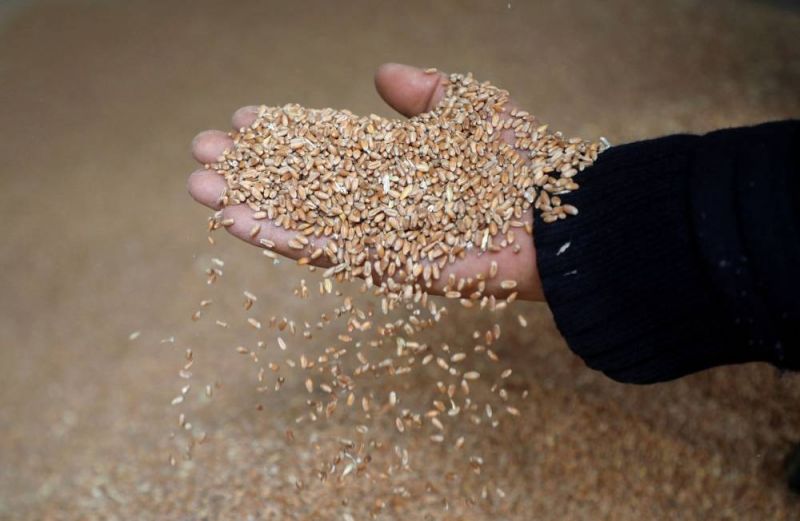
A worker displays grains of wheat at a mill in Beirut on March 1. (Credit: Mohamed Azakir/Reuters)
Want to get the Morning Brief by email? Click here to sign up.
Amid fears of a new fuel shortage, lengthy queues reappeared at gas stations across Lebanon over the weekend. The long queues have re-emerged over fears that the price of gasoline would increase again today. The increase comes after the price of oil crossed the $100 per barrel threshold following Russia’s invasion of Ukraine on Feb. 14. Yesterday, State Security toured gas stations in several areas, obliging those that were closed to reopen to sell fuel. On Saturday, Culture Minister Mohamed Murtada tried to assuage fears of an impending fuel crisis, saying via Twitter, “There are attempts to create a crisis and to make people panic,” but he added that fuel shipments are set to unload today or tomorrow. The gas station owners’ syndicate last week accused fuel importers of hoarding gasoline until prices increase. Yesterday, syndicate member George Brax assured the public in a televised interview that the quantities of gas were sufficient “for local needs” although less than the quantities imported in the past. Brax also called on the public to “not panic” while asking the central bank to release funds to process payments for fuel imports. BDL supplies fuel importers with 85 percent of the value of imported fuel in US dollars in exchange for its value in lira at the Sayrafa rate, while importers need to procure the remaining 15 percent of the payment at the market rate.
Flour mills in Lebanon have said they will limit the amount of flour they deliver due to the ongoing war in Ukraine. On Saturday, the Lebanon Mills Association said in a statement that a directive from the relevant government ministries had forced it to limit flour deliveries to those for Arabic bread production only. Earlier in the day, Economy Minister Amin Salam had sought to reassure the public that Lebanon has sufficient wheat supplies for a month and a half. The association’s rationing policy is intended to continue the production of flour for as long as possible. Wheat storage has been scarce in Lebanon since the Aug. 4, 2020 Beirut port blast destroyed the country’s grain silos. Russia’s invasion of Ukraine has halted the latter’s exports of wheat. Lebanon imports most of its wheat supplies from the Black Sea region, with both Russia and Ukraine topping the list of importers. Last Monday, a ship from Ukraine unloaded 7,000 tons of wheat in the Port of Tripoli with one more on its way. Both shipments departed Ukraine before the start of the war.
A leaked draft of the 2022 budget sent to Parliament removes some controversial provisions but remains unlikely to be approved without opposition. The changes to the new draft include the removal of proposed additional powers granted to the finance minister to calculate taxes and set the exchange rate. The latest draft renders these powers a privilege of the cabinet only. Another change made to the budget was the size of the deficit, now estimated at LL8.21 trillion, 10 percent smaller than the figure in the initial draft in January. Additionally, language that specifically differentiates between fresh-dollar accounts and ‘lollar’ — dollars deposited in Lebanese bank accounts and accessible at an exchange rate of LL8,000 — accounts was removed, with an exemption for one item on interest on fresh accounts. Other changes include a proposal to buy back all unused prepaid mobile phone service cards, increasing work permit fees and changing the currency of the exit fee on air travel from lira to US dollars. Despite these changes, the budget faces an uphill battle in Parliament based on the different positions of political groups and controversy surrounding how it was reportedly approved by the cabinet. Both Hezbollah and Amal objected to the way the budget was passed. However, Speaker Nabih Berri’s Amal Movement said that it would give the draft serious consideration in Parliament. An approved budget is one of the main requirements set by the International Monetary Fund before it agrees to a financial rescue package for the country. An IMF delegation is expected to arrive in Beirut in mid-March.
The CEO of the Fattal Group, Hubert Fattal, was found murdered in his home yesterday. Local media reported that he was stabbed to death in the neck and hip at his villa in the Metn town of Mansourieh. A security source, speaking to L’Orient Today on the condition of anonymity, confirmed the nature of Fattal’s death, adding that his perpetrator is still unknown. An investigation into the crime is ongoing. Fattal was 52 years old. The Fattal Group is one of Lebanon’s and the region's leading distribution companies.
In case you missed it, here’s our must-read story from the weekend: “Book lovers in a time of crisis: Exhibitors, visitors alike join valiant quest for joy at 63rd Beirut book fair”